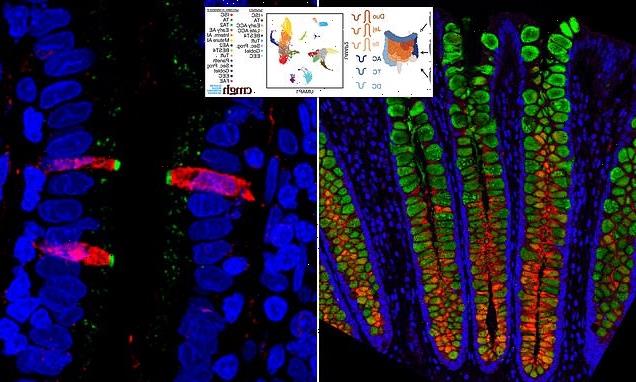Viagra could soon be given to DOGS! Erectile dysfunction drug is found to treat potentially fatal rare disorder in canines that affect their esophagus
- Researchers worked with ten dogs that had various levels of megaesophagus
- This is a rare eating disorder that enlarges the esophagus, stopping food moving into the stomach, leaving it bottled up inside the lower esophagus
- The dogs were given the generic version of Viagra, Sildenafil in liquid form
- This drug worked to relax the smooth stomach muscle of the lower esophagus
- This then opened it up and let the food pass to the stomach, providing relief
Viagra could be given to dogs that suffer from a rare eating disorder that can cause pneumonia, becoming a ‘life saving and life changing’ drug.
Sildenafil, the generic version of Viagra has been tested by a team of veterinarians at Washington State University in Pullman to treat a disorder called megaesophagus.
The condition involves an enlargement of the esophagus and a loss of the organ’s ability to move food to the stomach, which leaves food bottling up in the lower esophagus, and if left untreated can cause aspiration pneumonia.
It is actually a number of conditions, resultiing iin the esophagus becoming enlarged, and has been shown to be hereditary in a number of breeds, including Wire Haired Fox Terriers and Miniature Schnauzers.
Other breeds that may be predisposed are German Shepherd, Newfoundland, Great Dane, Irish Setter, Shar-pei, Greyhound and Labrador Retriever
Given in liquid form, the drug relaxes the smooth muscle of the lower esophagus, so that it can open up and let the food pass to the stomach, providing relief for the dog.
Viagra could be given to dogs that suffer from a rare eating disorder that can cause pneumonia, becoming a ‘life saving and life changing’ drug
Ten dogs with the condition, megaesophagus, were enrolled in the study and given either a placebo or sildenafil for two weeks, then one week without either drug, before switching them around, and taking the one they didn’t get before.
Owners had to keep a log of any regurgitation episodes during the five week study, but weren’t told which drug their dog was taking.
‘The literature tells us that many dogs with the disease die from aspiration pneumonia or are humanely euthanized due to poor quality of life within eight months of diagnosis,’ said Dr. Jillian Haines, who co-lead of the study.
Besides some rare gastrointestinal irritation, the team found no side effects to dogs from the drug, at the dose used in the study.
While sildenafil is most known to treat erectile dysfunction in humans, the drug is also used to treat elevated pulmonary blood pressure in dogs and humans.
‘There are no drugs we can use to manage megaesophagus,’ said Haines, adding that ‘Sildenafil is the first to target these mechanisms and reduce regurgitation, which is big because that’s what ultimately kills these dogs.’
Surgery can damage nerves supplying the penis, leaving up to eight in ten patients with erectile dysfunction (ED). Many will need lifelong medication, such as Viagra, but drugs fail to work in all cases (stock image)
‘It opens the lower esophageal sphincter for 20 minutes to an hour, which works really well for dogs because we only want that to open when they are eating.’
MEGAESOPHAGUS: A RARE EATING DISORDER IIN DOGS
Megaesophagus is a combination disorder in which the esophagus gets larger and loses its ability to move food into the stomach.
This can lead to food and liquid building up in the esophagus.
Regurgitation is the most common sign of megaesophagus, where food and water sloshes around in the esophagus and with the help of gravity, is released back up.
There are two types of megaesophagus.
Congenital megaesophagus, where the animal is born with the condition, and acquired megaesophagus which occurs later in life, in young adults and middle-aged animals.
The team used videofluoroscopy, which provides an image of real-time swallowing, to monitor liquid and later, blended wet food as it traveled down the esophagus.
There wasn’t a significant difference between the placebo and sildenafil during a 30-minute videofluoroscopy, however, nine out of the 10 owners reported reduced regurgitation during the two weeks when liquid sildenafil was administered.
‘In many cases, the owners were able to figure out which drug was sildenafil because it was working,’ Haines said, adding they also gained weight.
‘Moderately affected dogs that were regurgitating frequently but not excessively seemed to see the most dramatic results,’ Haines said. ‘I actually prescribed sildenafil to several of those patients after the study, and they are still using it today.’
Unfortunately the results weren’t as positive for dogs with severe signs of the disease, as it was harder to get the drug into the stomach for absorption.
While the study is promising, Haines said much is still to be known about the drug and hopes future studies will investigate its use in veterinary medicine further.
‘A lot of veterinarians are reaching out and asking about this drug,’ Haines said. ‘I think sildenafil will be life changing and life saving for a lot of dogs. This research helps support its use and hopefully will encourage more people to use it.’
The research, conducted at WSU’s College of Veterinary Medicine, was published in the American Journal of Veterinary Research.
Source: Read Full Article




